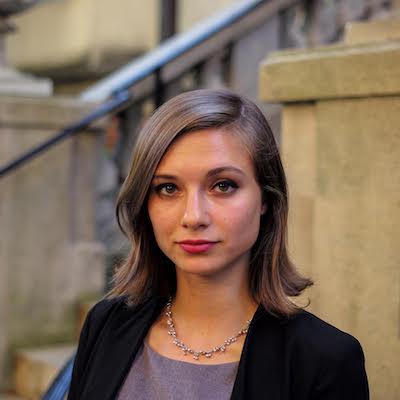Pretrial Detention Hearing Summary in United States v. Butina
The Russian Foreign Ministry’s Twitter account tweeted on Thursday:
Published by The Lawfare Institute
in Cooperation With

The Russian Foreign Ministry’s Twitter account tweeted on Thursday:
#NewProfilePic#FreeMariaButina pic.twitter.com/JbNKxBLIua
— MFA Russia (@mfa_russia) July 19, 2018
It may seem unusual for the foreign ministry of a world power to begin a Twitter hashtag campaign. But @mfa_russia is known for its trolling—and Maria Butina, the woman the ministry seeks to #free, is no ordinary Russian.
Or so the Justice Department says.
The department unsealed a criminal complaint and supporting affidavit Monday accusing Butina, who was arrested last weekend, of conspiring to act as an agent of the Russian government without notifying the attorney general by embedding herself within conservative U.S. political groups, particularly a gun rights organization, widely reported to be the National Rifle Association (NRA). A federal grand jury in the District of Columbia returned an indictment against Butina on Tuesday accusing her of conspiring to act as an agent of a foreign power and acting as an agent of that power. Federal prosecutors filed a memo in support of their motion for pretrial detention on Wednesday morning, asking the court to deny Butina bail. Later that day, Butina appeared in court before Magistrate Judge Deborah A. Robinson.
The Butina case is notable for several reasons, as Lawfare described the day the criminal complaint was unsealed. The case is yet one more depiction of a Russian effort to interfere with U.S. politics during the 2016 election campaign—though Butina’s activities seem to have predated the Kremlin’s election interference efforts. Notably, though, the case against Butina is being handled not by Special Counsel Robert Mueller but by the U.S. attorney for the District of Columbia and the Justice Department’s National Security Division. And it’s not clear to what extent, if any, Butina’s efforts were connected to the election interference project and L’Affaire Russe more broadly.
Given the unique nature of the case and the tantalizing questions it poses, we trekked over to the courthouse for Butina’s detention hearing on Wednesday. We didn’t find answers to our questions—nor would we expect to this early in the case. But we heard the first articulation of the defense’s theory of the case—that Butina is a graduate student who got involved in politics and forgot to make a regulatory filing—and saw the prosecution’s unredacted exhibits implicating Butina’s connections to Russian intelligence. Equally notable is what was not articulated at the hearing: any mention of the U.S. citizen (referred to as U.S. Person 2) that court documents describe as the target of Butina’s efforts to establish a backchannel between U.S. policymakers and representatives of the Russian government.
Among the long line of people waiting to enter the courtroom for Butina’s hearing were a group of Russian consular officials and journalists for Sputnik and RT. Butina, whose name has been spelled both Mariia and Maria in government documents, was led into the courtroom in an orange jumpsuit, despite a motion for the judge to permit her “to appear ... in civilian clothes and without restraints.” (In denying the motion, Robinson reprimanded the defense for making the request within an hour of when the hearing was set to convene, “affording no opportunity for consideration by the Marshal of said request.”)
Assistant U.S. Attorney for the District of Columbia Erik Kenerson relied heavily on the activities cited in the government’s filings in arguing that Butina was an agent of the Russian government and that, as such, she posed too great a flight risk to be let out on bail. He dismissed the defense’s arguments that Butina was merely an international graduate student at American University as “not only absurd” but also a “flat out lie.” Although Kenerson presented little new evidence, the government’s proffer provided a detailed, overarching picture of its case against Butina: This was a carefully planned conspiracy, funded by individuals with ties to the Russian government, overseen by a high-ranking Russian central banker (the “Russian Official” referred to in the July 16 affidavit, widely reported to be Alexander Torshin), and executed by Butina through her contacts within the United States. Throughout the hearing, defense counsel struggled to characterize Butina as an international student under suspicion only because of her nationality.
As evidence of the conspiracy, Kenerson pointed to an email sent by Butina to an individual the government describes as U.S. Person 1 on March 24, 2015, in which she discusses a “project proposal” to cultivate influence in a U.S. political party through the NRA. At the end of the email, Butina mentions having a budget of $125,000 for the purpose of attending conferences and other activities that would support the interests of the Russian Ministry of Foreign Affairs. Kennerson then pointed to communications from Torshin, in which he praised Butina’s efforts to create a “communication channel” through friendship dinners and noted that she may well have been “preventing conflict” between the U.S. and Russia.
Kenerson sought to establish that a chain of command, not merely a mentor-mentee relationship, existed between Torshin and Butina. The two communicated frequently during Butina’s time in the United States, as detailed in the criminal complaint, and the government recounted many of their messages at Wednesday’s hearing. Perhaps the most telling message, at least with regard to the Torshin-Butina relationship, was sent on the morning of Nov. 9, 2016: Shortly after the outcome of the presidential election was announced, Butina tells Torshin that she is “ready for further orders.”
As recently as March 2017, Butina appeared to believe that the U.S. government was deliberately leaving her alone. In an exchange that month with Torshin, Butina says that although she is sorry about a “leak,” she believes that there is an “[o]rder not to touch us.” Citing that message, the government argued Wednesday that Butina’s belief that the U.S. government was deliberately leaving her alone was the reason she did not flee the country despite scrutiny from congressional investigators and the Federal Election Commission.
Notably, new evidence presented by the government—both in the memorandum in support of pretrial detention and during the hearing—suggests ties between Butina and the Russian government beyond her relationship with Torshin. Kenerson referenced a series of emails dating to at least December 2014, when Butina began referring to a wealthy Russian businessman as her “funder.” According to the government’s memorandum in support of pretrial detention, the man—who remained unnamed during the hearing—has “deep ties” to Vladimir Putin’s regime.
The government’s evidence didn’t stop at oligarchs with links to the Kremlin. Also offered was a handwritten note found among the effects of U.S. Person 1, and consistent with his handwriting, titled “Maria’s ‘Russian Patriots In-Waiting’ Organization.” One of the points listed on the note asked “How to respond to FSB offer of employment?”

(U.S. Attorney's Office for the District of Columbia; photo courtesy of Buzzfeed News's Zoe Tillman)
And then there was “Exhibit 2,” a photo of Butina having dinner with a known Russian intelligence officer in Washington, D.C. (While the government blurred out the face of the intelligence officer in the exhibit made available after the hearing, the man’s face was visible in the courtroom projection.) Clearly, the government argued, Butina was in contact with Russian intelligence officials during her time in the United States.

(U.S. Attorney's Office for the District of Columbia; photo courtesy of Buzzfeed News's Zoe Tillman)
Butina’s defense counsel—Robert Driscoll, a former deputy assistant attorney general for civil rights—stressed at one point that Butina’s case should not be considered a part of the larger special counsel investigation and that it had nothing to do with the recent indictment of 12 Russian intelligence officers. At one point, Driscoll pleaded with the judge to consider the case on its own merits rather than as a proxy for “issues our country has with Russia.” “This is not a spy case,” he said.
There was an awkward interaction between the defense and prosecution over the nature of the foreign-agent charges brought against Butina. While ending his proffer, Driscoll said that Butina’s case is not one of espionage but a “regulatory filing case.” The prosecution took issue with that characterization: Kenerson pointed out that Butina wasn’t charged with failure to file under the Foreign Agents Registration Act (FARA)—in violation of 22 U.S.C. §618(a)(1), which carries a penalty of up to five years in prison—but with acting as a foreign agent under 18 U.S.C. §951, which carries a penalty of up to 10 years. As the Justice Department’s National Security Division clarifies, whereas FARA aims at persons involved in political activities, Section 951 “is aimed at non-political activities, and requires all agents operating under the control of foreign governments or foreign officials, other than diplomats, to notify the Attorney General before acting.” While a FARA filing is sufficient to meet the Section 951 notification requirement, it is not the only means of doing so.
Butina’s case is interesting partly because of her alleged interactions with Americans: The government’s court filings describe a sexual relationship with “U.S. Person 1,” as well as efforts to reach out to “U.S. Person 2.” The Washington Post has identified U.S. Person 1 as Paul Erickson, a Republican political operative with strong connections to the NRA, and he was the subject of much of the hearing—from his extensive communications with Butina to the note mentioning employment by a Russian intelligence agency found among his belongings.
But not once in Wednesday’s hearing did either party mention U.S. Person 2, about whom relatively little is yet known. The affidavit in support of the criminal complaint against Butina describes this person as a U.S. citizen who was involved in a series of email exchanges in 2016 and 2017 between Russian nationals—including Butina—and “U.S. persons having influence in American politics.” The identity of U.S. Person 2 could explain a great deal about the scope of Butina’s work and how high she managed to climb in Republican politics. But unless the trial reveals more about him or her, all that may be known for some time is what was clear at the end of the detention hearing: that Butina told the person that a representative of Putin approved of their “Russian-American project” and that he or she left Torshin “very much impressed.”
Just as @mfa_russia has a new face in Maria Butina, perhaps L’Affaire Russe may as well.





_-_flickr_-_the_central_intelligence_agency_(2).jpeg?sfvrsn=c1fa09a8_5)

